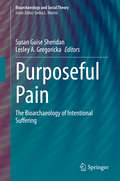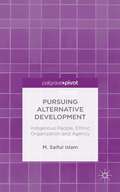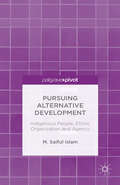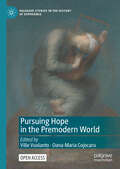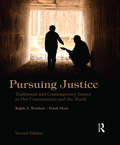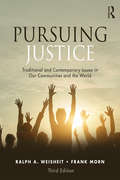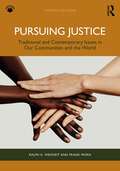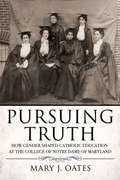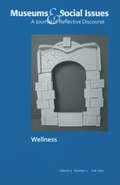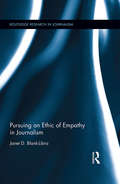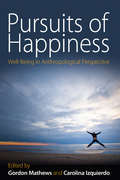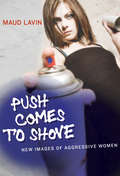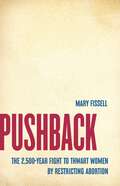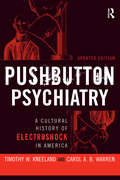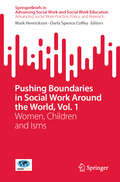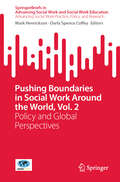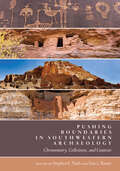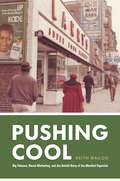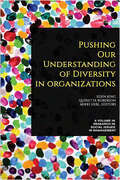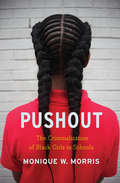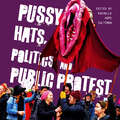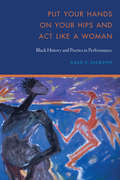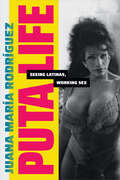- Table View
- List View
Purposeful Pain: The Bioarchaeology of Intentional Suffering (Bioarchaeology and Social Theory)
by Susan Guise Sheridan Lesley A. GregorickaPain is an evolutionary and adaptive mechanism to prevent harm to an individual. Beyond this, how it is defined, expressed, and borne is dictated culturally. Thus, the study of pain requires a holistic approach crossing cultures, disciplines, and time. This volume explores how and why pain-inducing behaviors are selected, including their potential to demonstrate individuality, navigate social hierarchies, and express commitment to an ideal. It also explores how power dynamics affect individual choice, at times requiring self-induced suffering. Taking bioanthropological and bioarchaeological approaches, this volume focuses on those who purposefully seek pain to show that, while often viewed as “exotic,” the pervasiveness of pain-inducing practices is more normative than expected. Theory and practice are employed to re-conceptualize pain as a strategic path towards achieving broader individual and societal goals. Past and present motivations for self-inflicted pain, its socio-political repercussions, and the physical manifestations of repetitive or long-term pain inducing behaviors are examined. Chapters span geographic and temporal boundaries and a wide variety of activities to illustrate how purposeful pain is used by individuals for personal expression and manipulated by political powers to maintain the status quo. This volume reveals how bioarchaeology illuminates paleopathology, how social theory enhances bioarchaeology, and how ethnography benefits from a longer temporal perspective.
Pursuing Alternative Development: Indigenous People, Ethnic Organization and Agency
by M. Saiful IslamPursuing Alternative Development.
Pursuing Alternative Development: Indigenous People, Ethnic Organization and Agency
by M. Saiful IslamDrawing upon ethnographic descriptions of three grassroots ethnic organizations, which work for indigenous peoples in promoting economic livelihood, education and strive for social justice, this book investigates the possibilities and challenges of alternative development.
Pursuing Hope in the Premodern World (Palgrave Studies in the History of Experience)
by Ville Vuolanto Oana-Maria CojocaruThis open access book provides the first scholarly account of the role of hope and hopefulness from the perspective of social and cultural life in ancient, medieval and early modern societies. This edited collection brings together fourteen chapters based on case-studies from its contributors, along with a theoretical chapter that serves as the introduction. Throughout history, people have gone on with their lives despite many kinds of trials and tribulations. In this, hope, understood as a future-oriented positive disposition, has been a major driving force to manage uncertainty, mitigate despair, and to give meaning to living. This book analyzes these life situations and changing responses to them in the context of hope and futurity in a longue durée perspective.
Pursuing Justice: Traditional and Contemporary Issues in Our Communities and the World
by Frank Morn Ralph A. WeisheitPursuing Justice, Second Edition, examines the issue of justice by considering the origins of the idea, formal systems of justice, current global issues of justice, and ways in which justice might be achieved by individuals, organizations, and the global community. Part 1 demonstrates how the idea of justice has emerged over time, starting with religion and philosophy, then moving to the justice as a concern of the state, and finally to the concept of social justice. Part 2 outlines the very different mechanisms used by various nations for achieving state justice, including systems based on common law, civil law, and Islamic law, with a separate discussion of the US justice system. Part 3 focuses on four contemporary issues of justice: war, genocide, slavery, and the environment. Finally, Part 4 shows how individuals and organizations can go about pursuing justice, and describes the rise of global justice. This updated timely book helps students understand the complexities and nuances of a society's pursuit of justice. It provides students with the foundations of global justice systems, integrating Greek philosophies and major religious perspectives into a justice perspective, and contributes to undergraduate understanding of international justice bodies, NGOs, and institutions. New edition is completely updated and revised to achieve relevance for today's students Covers concepts of justice as well as ideas for pursuing and achieving justice Examines how our modern laws began, and traces their evolution to today's laws Presents concepts and issues in justice studies as well as a comparison of several systems of law Teaching resources include discussion questions and real-world examples
Pursuing Justice: Traditional and Contemporary Issues in Our Communities and the World
by Frank Morn Ralph A. WeisheitPursuing Justice, Third Edition, examines the issue of justice by considering the origins of the idea, formal systems of justice, current global issues of justice, and ways in which justice might be achieved by individuals, organizations, and the global community. Part I demonstrates how the idea of justice has emerged over time, starting with religion and philosophy, and then to the concept of social justice. Part II outlines the very different mechanisms used by various nations for achieving state justice, including systems based on common law, civil law, and Islamic law, with a separate discussion of the US justice system. Part III focuses on six contemporary issues of justice: war, immigration, domestic terrorism, genocide, slavery, and the environment. Finally, Part IV shows how individuals and organizations can go about pursuing justice, and describes the rise of global justice. This updated timely book helps students understand the complexities and nuances of a society's pursuit of justice. It provides students with the foundations of global justice systems, integrating Greek philosophies and major religious perspectives into a justice perspective, and contributes to undergraduate understanding of international justice bodies, NGOs, and institutions. New to the third edition is a complete chapter on immigration, with a focus on historical and global patterns as they relate to justice, as well as new material on the #MeToo and Black Lives Matter movements, the genocide of the Rohingya of Myanmar, and the sovereign citizens movement in relation to domestic terrorism.
Pursuing Justice: Traditional and Contemporary Issues in Our Communities and the World
by Frank Morn Ralph A. WeisheitPursuing Justice, Fourth Edition, examines the issue of justice by considering the origins of the idea, formal systems of justice, current global issues of justice, and ways in which justice might be achieved by individuals, organizations, and the global community. Part I demonstrates how the idea of justice has emerged over time, starting with religion and philosophy, and then to the concept of social justice. Part II outlines the very different mechanisms used by various nations for achieving state justice, including systems based on common law, civil law, and Islamic law, with a separate discussion of the U.S. justice system. Part III focuses on six contemporary issues of justice: war, immigration, domestic terrorism, genocide, slavery, and the environment. Finally, Part IV shows how individuals and organizations can go about pursuing justice, and describes the rise of global justice.This updated book uses current events and debates to help students understand the complexities and nuances of a society’s pursuit of justice. It provides students with the foundations of global justice systems, integrating Greek philosophies and major religious perspectives into a justice perspective, and contributes to undergraduate understanding of international justice bodies, NGOs, and institutions.
Pursuing Truth: How Gender Shaped Catholic Education at the College of Notre Dame of Maryland (Cushwa Center Studies of Catholicism in Twentieth-Century America)
by Mary J. OatesIn Pursuing Truth, Mary J. Oates explores the roles that religious women played in teaching generations of college and university students amid slow societal change that brought the grudging acceptance of Catholics in public life. Across the twentieth century, Catholic women's colleges modeled themselves on, and sometimes positioned themselves against, elite secular colleges. Oates describes these critical pedagogical practices by focusing on Notre Dame of Maryland University, formerly known as the College of Notre Dame of Maryland, the first Catholic college in the United States to award female students four-year degrees.The sisters and laywomen on the faculty and in the administration at Notre Dame of Maryland persevered in their work while facing challenges from the establishment of the Catholic Church, mainline Protestant churches, and secular institutions. Pursuing Truth presents the stories of the institution's female founders, administrators, and professors whose labors led it through phases of diversification. The pattern of institutional development regarding the place of religious identity, gender and sexuality, and race that Oates finds at Notre Dame of Maryland is a paradigmatic story of change in US higher education. Similarly representative is her account of the school's effort, from the late 1960s to the present, to maintain its identity as a women's liberal arts college.Thanks to generous funding from the Cushwa Center at the University of Notre Dame, the ebook editions of this book are available as Open Access (OA) volumes from Cornell Open (cornellopen.org) and other Open Access repositories.
Pursuing Wellness: Museums & Social Issues 5:2 Thematic Issue (Museums & Social Issues)
by John Fraser; Judy KokeFirst published in 2010 as a volume of Museums and Social Issues, A Journal of Reflective Discourse as Volume 5, number 2. What does wellness really mean? How do we enjoy the experience of being well or honor good health? What does it take to Pro-actively court the most positive potential for your future self? Health is one of the pressing topics of our age. This issue sets out to look at how museums create public value by bringing health issues to the fore.
Pursuing an Ethic of Empathy in Journalism (Routledge Research in Journalism)
by Janet Blank-LibraThis book advances a journalistic theory of empathy, challenging long-held notions about how best to do journalism. Because the institution of journalism has typically equated empathy and compassion with bias, it has been slow to give the intelligence of the emotions a legitimate place in the reporting and writing process. Blank-Libra’s work locates the point at which the vast, multidisciplinary research on empathy intersects with the work of the journalist, revealing a reality that has always been so: journalists practice empathy as a way to connect but also as a form of inquiry, as sincere and legitimate in its goals and aspirations as is objectivity.
Pursuits Of Happiness
by Carolina Izquierdo Gordon MathewsAnthropology has long shied away from examining how human beings may lead happy and fulfilling lives. This book, however, shows that the ethnographic examination of well-being--defined as "the optimal state for an individual, a community, and a society"--and the comparison of well-being within and across societies is a new and important area for anthropological inquiry. Distinctly different in different places, but also reflecting our common humanity, well-being is intimately linked to the idea of happiness and its pursuits. Noted anthropological researchers have come together in this volume to examine well-being in a range of diverse ways and to investigate it in a range of settings: from the Peruvian Amazon, the Australian outback, and the Canadian north, to India, China, Indonesia, Japan, and the United States.
Push Comes to Shove: New Images of Aggressive Women
by Maud LavinThe new celebration of women's aggression in contemporary culture, from Kill Bill and Prime Suspect to the artists group Toxic Titties.In the past, more often than not, aggressive women have been rebuked, told to keep a lid on, turn the other cheek, get over it. Repression more than aggression was seen as woman's domain. But recently there's been a noticeable cultural shift. With growing frequency, women's aggression is now celebrated in contemporary culture—in movies and TV, online ventures, and art. In Push Comes to Shove, Maud Lavin examines these new images of aggressive women and how they affect women's lives.Aggression, says Lavin, need not entail causing harm to another; we can think of it as the use of force to create change—fruitful, destructive, or both. And over the past twenty years, contemporary culture has shown women seizing this power. Lavin chooses provocative examples to explore the complexity of aggression, including the surfer girls in Blue Crush, Helen Mirren as Jane Tennison in Prime Suspect, the homicidal women in Kill Bill, and artist Marlene McCarty's mural-sized Murder Girls.Women need aggression and need to use it consciously, Lavin writes. With Push Comes to Shove, she explores the crucial questions of how to manifest aggression, how to represent it, and how to keep open a cultural space for it.
Pushback: The 2,500-Year Fight to Thwart Women by Restricting Abortion
by Mary FissellThe long history of how restricting access to abortion has been used to curtail women&’s advancement Attitudes about abortion cycle between long periods of widespread tolerance, to repression, and back again. What accounts for these pendulum swings? From ancient Greece to the modern West, historian of medicine Mary Fissell argues, abortion repression springs up in response to men&’s anxieties about women&’s increasing independence. In Pushback, Fissell shows that, across centuries and continents, abortion has always been commonplace, and persecuting women for ending pregnancies has been about controlling their behavior. As Protestantism de-emphasized celibacy, new abortion restrictions policed unmarried women&’s sex lives. Nineteenth-century men unsettled by first-wave feminism hoped to establish medicine as a male profession, and so advocated for abortion bans to undercut women&’s new roles as physicians. Fissell presents this history through the hidden stories of women committed to reproductive self-determination: holy women of the early Catholic Church whose ability to end pregnancies was considered miraculous, midwives accused of witchcraft or criminal conspiracy, and everyday women whose pregnancies threatened their livelihoods—and their lives.Pushback is essential reading for understanding the complex history of abortion and making sense of recent crackdowns on reproductive rights.
Pushbutton Psychiatry: A Cultural History of Electric Shock Therapy in America, Updated Paperback Edition
by Carol A.B. Warren Timothy W KneelandThis volume uncovers the roots of electroshock in America, an outgrowth of western patriarchal medicine with primarily female patients. The authors trace the history of electroshock in the United States in three historic stages: from an enthusiastic reception in 1940, to a period of crisis in the 1960s, to its resurgence after 1980. Early American experiments with electrical medicine are also examined, while the development of electroshock in America is considered through the lens of social, political, and economic factors. The revival of electroshock in recent decades is found to be a product of growing materialism in American psychiatry and the political and economic realities of managed medical care. The new material in the Updated Paperback Edition describes the resurgence of electroshock in the private psychiatric sector as a treatment of choice for depression.
Pushing Boundaries in Social Work Around the World, Vol. 1: Women, Children and Isms (SpringerBriefs in Advancing Social Work and Social Work Education)
by Mark Henrickson Darla Spence CoffeyThis book provides examples of how social workers have pushed back against civic and private corporate powers that attempt to control women, children, racialised and stigmatised groups, migrants, and indigenous peoples, and public policy agendas that continue to vulnerabilise and marginalise people. This is the first book of a two-volume set that focuses on how authors have pushed boundaries in a particular field of practice, research or policy in social work. The books are culturally, gender-, and geographically inclusive, with contributors from every inhabited continent. It is future-focused, hopeful, and inspiring: it focuses on solutions rather than merely elaborating problems. The book includes chapters from a continuum of experienced practitioners and early career researchers; this provides a nuanced and accessible view of boundaries from both ends of the career path. The global definition of social work says that the discipline 'promotes social change and development, social cohesion and the empowerment and liberation of people' but in many nations where social work exists, social workers are expected to act as agents of social control, ensuring that people—particularly 'the poor'—conform to established political and social norms. Most often social workers are initially attracted to the discipline because they want to empower and liberate vulnerabilised and marginalised people and communities. In order to accomplish these high-minded goals, social workers must occasionally push boundaries that confine their practice. This volume contains eight chapters from social workers who are pushing social work boundaries in their own social and national settings. The contents are organised into two clusters: pushing boundaries for women and children and pushing boundaries against isms and stigma. Each chapter contains learnings that are applicable in different practice settings around the world. Pushing Boundaries in Social Work Around the World, Vol. 1: Women, Children and Isms inspires social workers to push against the boundaries we impose on ourselves and our discipline. This book helps social workers rediscover the spark that initially drew them to their work.
Pushing Boundaries in Social Work Around the World, Vol. 2: Policy and Global Perspectives (SpringerBriefs in Advancing Social Work and Social Work Education)
by Mark Henrickson Darla Spence CoffeyThis book provides examples of how social workers have pushed back against neoliberalism, attempts to co-opt or silence social workers, and reproduce philosophical and ethical assumptions that divide humans from each other and from the natural world. This is the second book of a two-volume set that focuses on how authors have pushed boundaries in a particular field of practice, research or policy in social work. The books are culturally, gender-, and geographically inclusive, with contributors from every inhabited continent. It is future-focused, hopeful, and inspiring: it focuses on solutions rather than merely elaborating problems. The book includes chapters from a continuum of experienced practitioners and early career researchers; this provides a nuanced and accessible view of boundaries from both ends of the career path. The global definition of social work says that the discipline &‘promotes social change and development, social cohesion and the empowerment and liberation of people&’ but in many nations where social work exists, social workers are expected to act as agents of social control, ensuring that people—particularly &‘the poor&’—conform to established political and social norms. Most often social workers are initially attracted to the discipline because they want to empower and liberate vulnerabilised and marginalised people and communities. In order to accomplish these high-minded goals, social workers must occasionally push boundaries that confine their practice. This volume contains eight chapters from social workers who are challenging policy and the way social work is practiced in their national settings. Authors in this book interrogate the notion of national boundaries and contemporary populist self-interest. Not only are political boundaries considered, but the boundaries between humans and their natural environments are reconsidered. The book concludes by setting out key decisions that the global social work discipline must make in order to create its future, and identifies key markers on the path to that future. Pushing Boundaries in Social Work Around the World, Vol. 2: Policy and Global Perspectives invites social workers to reconsider their assumptions about policy practice and boundaries themselves. It encourages them to rediscover the spark that originally drew them to their work.
Pushing Boundaries in Southwestern Archaeology: Chronometry, Collections, and Contexts (Proceedings of SW Symposium)
by Stephen E. Nash Erin BaxterPushing Boundaries in Southwestern Archaeology draws together the proceedings from the sixteenth biennial Southwest Symposium. In exploring the conference theme, contributors consider topics ranging from the resuscitation of archaeomagnetic dating to the issue of Athapaskan origins, from collections-based studies of social identity, foodways, and obsidian trade to the origins of a rock art tradition and the challenges of a deeply buried archaeological record. The first of the volume’s four sections examines the status, history, and prospects of Bears Ears National Monument, the broader regulatory and political boundaries that complicate the nature and integrity of the archaeological record, and the cultural contexts and legal stakes of archaeological inquiry. The second section focuses on chronological “big data” in the context of pre-Columbian history and the potential and limits of what can be empirically derived from chronometric analysis of the past. The chapters in the third section advocate for advancing collections-based research, focusing on the vast and often untapped research potential of archives, previously excavated museum collections, and legacy data. The final section examines the permeable boundaries involved in Plains-Pueblo interactions, obvious in the archaeological record but long in need of analysis, interpretation, and explanation. Contributors: James R. Allison, Erin Baxter, Benjamin A. Bellorado, Katelyn J. Bishop, Eric Blinman, J. Royce Cox, J. Andrew Darling, Kaitlyn E. Davis, William H. Doelle, B. Sunday Eiselt, Leigh Anne Ellison, Josh Ewing, Samantha G. Fladd, Gary M. Feinman, Jeffrey R. Ferguson, Severin Fowles, Willie Grayeyes, Matthew Guebard, Saul L. Hedquist, Greg Hodgins, Lucas Hoedl, John W. Ives, Nicholas Kessler, Terry Knight, Michael W. Lindeman, Hannah V. Mattson, Myles R. Miller, Lindsay Montgomery, Stephen E. Nash, Sarah Oas, Jill Onken, Scott G. Ortman, Danielle J. Riebe, John Ruple, Will G. Russell, Octavius Seowtewa, Deni J. Seymour, James M. Vint, Adam S. Watson
Pushing Cool: Big Tobacco, Racial Marketing, and the Untold Story of the Menthol Cigarette
by Keith WailooSpanning a century, Pushing Cool reveals how the twin deceptions of health and Black affinity for menthol were crafted—and how the industry’s disturbingly powerful narrative has endured to this day. Police put Eric Garner in a fatal chokehold for selling cigarettes on a New York City street corner. George Floyd was killed by police outside a store in Minneapolis known as “the best place to buy menthols.” Black smokers overwhelmingly prefer menthol brands such as Kool, Salem, and Newport. All of this is no coincidence. The disproportionate Black deaths and cries of “I can’t breathe” that ring out in our era—because of police violence, COVID-19, or menthol smoking—are intimately connected to a post-1960s history of race and exploitation. In Pushing Cool, Keith Wailoo tells the intricate and poignant story of menthol cigarettes for the first time. He pulls back the curtain to reveal the hidden persuaders who shaped menthol buying habits and racial markets across America: the world of tobacco marketers, consultants, psychologists, and social scientists, as well as Black lawmakers and civic groups including the NAACP. Today most Black smokers buy menthols, and calls to prohibit their circulation hinge on a history of the industry’s targeted racial marketing. In 2009, when Congress banned flavored cigarettes as criminal enticements to encourage youth smoking, menthol cigarettes were also slated to be banned. Through a detailed study of internal tobacco industry documents, Wailoo exposes why they weren’t and how they remain so popular with Black smokers.
Pushing Cool: Big Tobacco, Racial Marketing, and the Untold Story of the Menthol Cigarette
by Keith WailooSpanning a century, Pushing Cool reveals how the twin deceptions of health and Black affinity for menthol were crafted—and how the industry’s disturbingly powerful narrative has endured to this day. Police put Eric Garner in a fatal chokehold for selling cigarettes on a New York City street corner. George Floyd was killed by police outside a store in Minneapolis known as “the best place to buy menthols.” Black smokers overwhelmingly prefer menthol brands such as Kool, Salem, and Newport. All of this is no coincidence. The disproportionate Black deaths and cries of “I can’t breathe” that ring out in our era—because of police violence, COVID-19, or menthol smoking—are intimately connected to a post-1960s history of race and exploitation. In Pushing Cool, Keith Wailoo tells the intricate and poignant story of menthol cigarettes for the first time. He pulls back the curtain to reveal the hidden persuaders who shaped menthol buying habits and racial markets across America: the world of tobacco marketers, consultants, psychologists, and social scientists, as well as Black lawmakers and civic groups including the NAACP. Today most Black smokers buy menthols, and calls to prohibit their circulation hinge on a history of the industry’s targeted racial marketing. In 2009, when Congress banned flavored cigarettes as criminal enticements to encourage youth smoking, menthol cigarettes were also slated to be banned. Through a detailed study of internal tobacco industry documents, Wailoo exposes why they weren’t and how they remain so popular with Black smokers.
Pushing Our Understanding Of Diversity In Organizations: A Volume in Research in Social Issues in Management
by Michelle R. Hebl Eden King Quinetta M. RobersonFew time periods in the past five decades match the intensity of intergroup conflict that people around the world are currently experiencing. Polarized attitudes around various sociopolitical issues, such as gender equality and immigration, have dominated the media and our lives. Furthermore, these powerful social dynamics have also impacted the places where we work and intensified existing strains on workers and workplaces. To address these issues and improve organizational climates, more theories, research and collaborations to understand these phenomena are needed. The volumes in this series will describe and instigate scholarship that advances our understanding of diversity in organizations. <P><P> This volume features renowned scholars who are unabashedly pushing the field by raising the questions that need to be asked, by working on topics that have received far too little research attention, and by holding researchers, practitioners, managers, organizations, and readers to task for doing what needs to be done to maximize social justice and egalitarian behaviors in the workplace. The chapters provoke the status quo in society and in scholarship, and in so doing, push our understanding of diversity in organizations.
Pushing the Boundaries of Latin American Testimony
by Louise Detwiler Janis BreckenridgeRevealing twenty-first century contexts, ground-breaking scenarios, and innovative mediums for this highly contested life writing genre, this volume showcases a new generation of testimonio scholarship.
Pushout: The Criminalization of Black Girls in Schools
by Monique W. Morris<P>Fifteen-year-old Diamond stopped going to school the day she was expelled for lashing out at peers who constantly harassed and teased her for something everyone on the staff had missed: she was being trafficked for sex. After months on the run, she was arrested and sent to a detention center for violating a court order to attend school. <P>Just 16 percent of female students, Black girls make up more than one-third of all girls with a school-related arrest. The first trade book to tell these untold stories, Pushout exposes a world of confined potential and supports the growing movement to address the policies, practices, and cultural illiteracy that push countless students out of school and into unhealthy, unstable, and often unsafe futures. <P>For four years Monique W. Morris, author of Black Stats, chronicled the experiences of black girls across the country whose intricate lives are misunderstood, highly judged-by teachers, administrators, and the justice system-and degraded by the very institutions charged with helping them flourish. Morris shows how, despite obstacles, stigmas, stereotypes, and despair, black girls still find ways to breathe remarkable dignity into their lives in classrooms, juvenile facilities, and beyond.
Pussy Hats, Politics, and Public Protest
by Rachelle Hope SaltzmanCo-winner of the 2021 Elli Köngäs-Maranda Prize awarded by the Women's Section of the American Folklore SocietyContributions by Susan Eleuterio, Andrea Glass, Rachelle Hope Saltzman, Jack Santino, Patricia E. Sawin, and Adam Zolkover The 2016 US presidential campaign and its aftermath provoked an array of protests notable for their use of humor, puns, memes, and graphic language. During the campaign, a video surfaced of then-candidate Donald Trump’s lewd use of the word “pussy”; in response, many women have made the issue and the term central to the public debate about women’s bodies and their political, social, and economic rights. Focusing on the women-centered aspects of the protests that started with the 2017 Women’s March, Pussy Hats, Politics, and Public Protest deals with the very public nature of that surprising, grassroots spectacle and explores the relationship between the personal and the political in the protests. Contributors to this edited collection use a folkloristic lens to engage with the signs, memes, handmade pussy hats, and other items of material culture that proliferated during the march and in subsequent public protests. Contributors explore how this march and others throughout history have employed the social critique functions and features of carnival to stage public protests; how different generations interacted and acted in the march; how perspectives on inclusion and citizenship influenced and motivated participation; how women-owned businesses and their dedicated patrons interacted with the election, the march, and subsequent protests; how popular belief affects actions and reactions, regardless of some objective notion of truth; and how traditionally female crafts and gifting behavior strengthened and united those involved in the march.
Put Your Hands on Your Hips and Act Like a Woman: Black History and Poetics in Performance
by Gale P. JacksonIn a gathering of griot traditions fusing storytelling, cultural history, and social and literary criticism, Put Your Hands on Your Hips and Act Like a Woman &“re-members&” and represents how women of the African diaspora have drawn on ancient traditions to record memory, history, and experience in performance. These women&’s songs and dances provide us with a wealth of polyphonic text that records their reflections on identity, imagination, and agency, providing a collective performed autobiography that complements the small body of pre-twentieth-century African and African American women&’s writing. Gale P. Jackson engages with a range of vibrant traditions to provide windows into multiple discourses as well as &“new&” and old paradigms for locating the history, philosophy, pedagogy, and theory embedded in a lineage of African diaspora performance and to articulate and address the postcolonial fragmentation of humanist thinking. In lyrically interdisciplinary movement, across herstories, geographies, and genres, cultural continuities, improvisation, and transformative action, Put Your Hands on Your Hips and Act Like a Woman offers a fresh perspective on familiar material and an expansion of our sources, reading, and vision of African diaspora, African American, and American literatures.
Puta Life: Seeing Latinas, Working Sex (Dissident Acts)
by Juana María RodríguezIn Puta Life, Juana María Rodríguez probes the ways that sexual labor and Latina sexuality become visual phenomena. Drawing on state archives, illustrated biographies, documentary films, photojournalistic essays, graphic novels, and digital spaces, she focuses on the figure of the puta—the whore, that phantasmatic figure of Latinized feminine excess. Rodríguez’s eclectic archive features the faces and stories of women whose lives have been mediated by sex work's stigmatization and criminalization—washerwomen and masked wrestlers, porn stars and sexiles. Rodríguez examines how visual tropes of racial and sexual deviance expose feminine subjects to misogyny and violence, attuning our gaze to how visual documentation shapes perceptions of sexual labor. Throughout this poignant and personal text, Rodríguez brings the language of affect and aesthetics to bear upon understandings of gender, age, race, sexuality, labor, disability, and migration. Highlighting the criminalization and stigmatization that surrounds sex work, she lingers on those traces of felt possibility that might inspire more ethical forms of relation and care.
